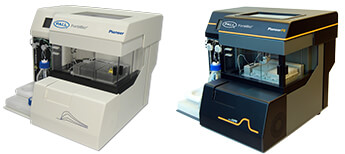
Pioneer and Pioneer FE Systems
The Pioneer platform offers high quality surface plasmon resonance (SPR) instruments for real-time, label-free measurements of biomolecular interactions. Complementing the characterization of biomolecular binding kinetics and affinity capabilities of Bio-Layer Interferometry (BLI) on the Octet platform, Pioneer systems extend measurement to include molecules smaller than 150 daltons and provide insight into fragment analysis and protein aggregation. OneStep® Injections on the Pioneer platform use Taylor dispersion to generate an analyte concentration gradient that provides a high-resolution dose response in a single injection — allowing full analyte titration over 3-4 orders of magnitude in concentration within a few minutes. OneStep can also be used to determine the analyte diffusion coefficient and assess whether the analyte is heterogeneous or aggregated.
Key Features of Pioneer Systems for Binding Kinetics and Affinity
- 3 channel, fully automated SPR system
- Eliminates time and error associated with making dilutions with OneStep gradient injections that acquire full kinetics titration in minutes automatically
- Exquisite sensitivity and minimal noise for high affinity binding pairs
- Up to 72 hours of unattended run time
- Integrated, proven data analysis software based on Scrubber and Clamp platforms
- Kretschmann optics for high sensitivity and stability
The Pioneer FE system enables SPR-based screening for identification of fragment candidates. Fragment screening is challenging with a large numbers of samples to process, low molecular weight analytes (<300 Da), and weak affinity interactions (KD: 10 µM to 10 mM). This combination of challenges makes it impractical to test binding above the KD and frequently results in making decisions based on small, square-shaped response curves. OneStep eliminates this by generating a continuous concentration gradient using the sample and running buffer. Weak affinity binding associated with fragments can be fitted with a real-time equilibrium isotherm model, since off-rates are fast enough to make the steady-state approximation. Competition assays are very useful in drug discovery, yielding the ability to find active site binders directly by competing fragment hits with a control molecule. Two sample components can be injected over the biosensor surface to perform a full kinetic analysis with site-specific competition using NeXtStep Injection technology.
Key Features of the Pioneer System for Fragment Screening
- Make decisions early on with reliable affinity (KD) and kinetic (kd, ka) data directly from the primary screen
- High throughput: up to 768 samples in 24 hours in a single experiment
- The only SPR instrument to perform fragment binding competition assays in a single injection
- Normalize screening data across different sensor chips, days, users or instruments to compare an entire screen campaign and select actives from the global data set